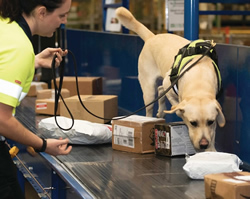 The Department of Agriculture, Water and the Environment (DAWE) has adopted a hard-line approach to unidentified seeds brought into Australia through the mail, with biosecurity officers ordered to destroy them on the spot.
The Department of Agriculture, Water and the Environment (DAWE) has adopted a hard-line approach to unidentified seeds brought into Australia through the mail, with biosecurity officers ordered to destroy them on the spot.
Head of Biosecurity at the DAWE, Andrew Tongue said more than 56,000 seed parcels from overseas had failed to meet import conditions last year, which represented 73 per cent of all detections of non-compliant products at Australia’s mail gateways in 2020.
“Most people understand that if they import meat products in the mail they run the risk of introducing diseases like African swine fever,” Mr Tongue said.
“Similarly, smuggling live plants through the mail could introduce deadly pathogens and disease like Myrtle Rust and our highest risk plant pest, Xylella,” he said.
Mr Tongue said because most seeds were small, there was a perception they were benign.
“They’re anything but harmless,” he said.
“At least 20 seed genera are known hosts for the destructive khapra beetle, and Buffel grass is a great example of seeds being introduced and planted in Australia, which is now a significant and costly environmental problem.
“Unfortunately, there’s a long list of ecosystem degradation and habitat decline in northern Australia caused by exotic imports like gamba, para and mission grasses, many of which were introduced as seeds.”
The Head of Biosecurity said whether people were buying unidentified seeds on purpose, or accidentally flouting biosecurity laws, it no longer mattered.
“If you’re bringing in unidentified seeds through the mail which aren’t compliant with import conditions, they’ll be destroyed in accordance with the Biosecurity Act 2015,” he said.
“If you want to import seeds, you need to ensure they’re correctly labelled and meet all other import conditions,” Mr Tongue said.


